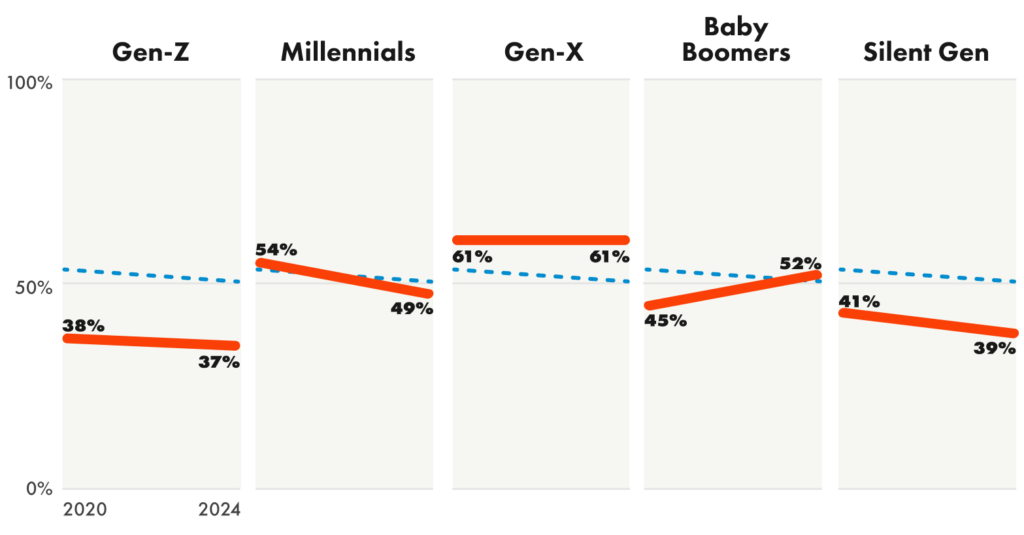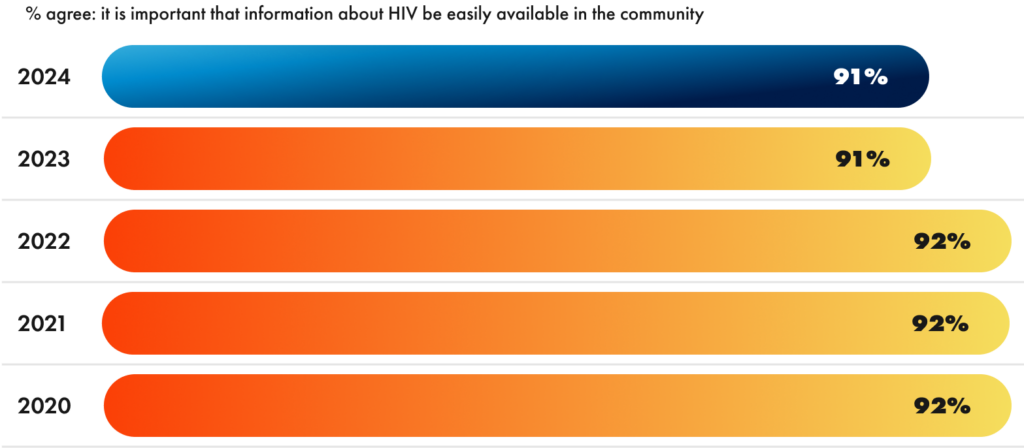Politics Is Causing a Huge Problem for Gen Z’s HIV Education
While knowledge about HIV is mostly stable across the United States, one generation does have a significant gap in knowledge when compared to their peers: Gen Z. Only 37% of Gen Z-aged people, ranging from ages 18 to 26, said they feel knowledgeable about HIV, according to GLAAD’s report this year. That percentage is steady from a similar sample asked the same question five years ago, but lagging behind their millennial and Gen X counterparts, as well as the total US average, which sits at about half.
Born after the earliest days of the AIDS epidemic and coming of age at a time when media depictions about HIV are dwindling, Gen Z does not have the same level of access to HIV as generations prior.
The generational gap in knowledge of HIV continues
Although stable, Gen Z adults continue to be the least knowledgeable generation about HIV compared to older generations.

Camryn Garrett, author of the book Full Disclosure, which features a Black woman born with HIV as a protagonist, is a Gen Z-er and said that she got no education around HIV in her high school health class. The only education about the virus at her high school in Long Island, New York, was a made-for-TV movie in which a person received an HIV diagnosis as punishment for bad behavior.
Garrett got the idea for Full Disclosure after reading adoption blogs and realizing that many young people with HIV were adopted across international and racial lines. Because she was not supplied with an adequate education in school around HIV, she didn’t realize that people with HIV could lead long, healthy lives and she had learned nothing about the AIDS crisis.
“Our history classes just sort of stopped before that,” she said. “It went up to the 1950s and 1960s and stopped. It’s not on any AP exam, the state exam, we just never talked about it.”
Americans continue to place a high importance on information about HIV being available in the community

A majority of Americans want information about HIV to be made available to the community; 91% of people GLAAD surveyed said they want accurate information about the virus to be readily available, including 89% of Gen Z adults. The interest in this information being readily available has remained stable over the five years that GLAAD has been asking this question. However, as anti-LGBTQ+ bills sweep the United States, information about sexual health, including HIV/AIDS education has been swept up in some lawmakers’ plans to limit students’ access to information about sex, sexuality, sexual orientation and gender identity.
In 2023, Iowa governor Kim Reynolds signed SF 496, a bill that prohibited any discussion of gender identity or sexual orientation in grade school classrooms. The bill also included a ban on information about HIV and HPV17. The Iowa bill emulates other anti-LGBTQ+ education bills that made their way through statehouses in recent years, a list that most famously includes Florida’s “Don’t Say Gay’’ bill.
While that bill does allow for the instruction of material related to HIV/AIDS, any educational materials must be approved by the state and be linked to an abstinence-only based sexual education curriculum18. Parents may also opt to remove their children from information about HIV/ AIDS19>. And, curricula aside, many queer high schoolers are reporting that it’s becoming even harder to create high school GSAs, meant as places for queer students to gather20.
When Garrett wrote Full Disclosure in high school, she had to undertake her own research in order to learn more about HIV. And when she did, she often found narratives that spoke solely about white, gay men. Then she read a story about a young Black girl trying to access HIV medication in a newspaper. “It was the first time that I saw a narrative about what it was like to grow up with HIV and it was the first time I saw a Black girl at the center of it,” she said
Of course, Gen Z is not a monolith and so much of how Gen Z accesses information, as evidenced above, can be as particular as what state, or even zip code, a person was born in.
“As a state, we don’t have really good comprehensive sex ed, and or LGBTQ affirming sex ed in schools,” said Domenico Ruggerio, the executive director of We Are Family, a South Carolina-based nonprofit that offers comprehensive sex education to LGBTQ+ youth. “Our legislature is hell bent on policing trans youth bodies from the books that they read, the sports that they play, and now sort of access to healthcare.”
Ruggerio says that roadblocks exist for people in some red states in ways that go far beyond education. In some states with less of a public transit infrastructure, for instance, there are fewer ways to have public service announcements or campaigns that raise awareness around public health. “You don’t have public transportation with messages around HIV like you can on the coasts,” he said.
Gen Z, and the generation after them, are facing an overlapping crisis of lack of access to information about HIV. And, with fewer pieces of film and television media portraying characters living with or dealing with HIV, this generation is not getting the HIV information they deserve, just as we are at a critical juncture in the ongoing epidemic.












